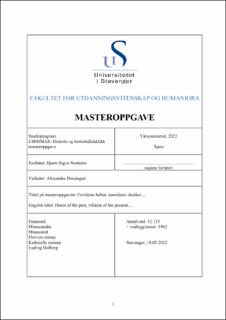| dc.contributor.advisor | Dessingué, Alexandre | |
| dc.contributor.author | Nesheim, Bjørn-Sigve | |
| dc.date.accessioned | 2022-07-27T15:51:14Z | |
| dc.date.available | 2022-07-27T15:51:14Z | |
| dc.date.issued | 2022 | |
| dc.identifier | no.uis:inspera:110337907:22278242 | |
| dc.identifier.uri | https://hdl.handle.net/11250/3008851 | |
| dc.description.abstract | I denne masteroppgaven undersøkes det hvilke minner som kommer til uttrykk i Holberg-debatten, og hva dette forteller oss om minnekulturen i denne debatten. Dette gjøres ved å ta utgangspunkt i minnebegrepsteorier hentet fra fagtradisjonen minnesstudier. Problemstillingen er: «Hvilke minner kommer til uttrykk i forbindelse med debatten om Ludvig Holberg og hva forteller det oss om minnekulturen i Holberg-debatten?». I tillegg er det stilt tre forskningsspørsmål som omhandler ulike deler av minnebruken og minnebegreper, hensikt og hva som kommer til uttrykk i Holberg-debatten.
Det er gjennomført en diskursanalyse for å besvare oppgavens problemstilling. Empirien i oppgaven er ulike tekster hentet fra norske aviser, og tekstene er i hovedsak skrevet av akademikere, samt et par intervjuer skrevet av journalister.
Analysen tar utgangspunkt i fortolkningen av innholdet i den ulike empirien, og ser dette i sammenheng med teorien og diskursanalysens punkter. Funnene i analysen viser hvilke minner som er fremtredende hos aktørene i debatten om Holbergs minnested. Dette inkluderer flerveis minne og kulturelt minne. Gjennom analysen kommer det frem hvordan aktørene anvender minner, historie og fortid i Holberg-debatten, samt hvor kaotisk hele debatten er med tanke på hva som faktisk diskuteres. Det som kommer frem i denne oppgaven viser at det er viktig, vanskelig og nødvendig med en debatt om hva som har plass i det offentlige rom og det kulturelle minnet i Norge. Det er behov for en vurdering av hva ulike historiske personer representerer gjennom deres tilstedevære i det kulturelle minne. | |
| dc.description.abstract | This master's thesis examines which memories are expressed in the Holberg debate, and what this tells us about the culture of memory in this debate. This is done by taking a starting point in theories of memory concepts taken from the subject tradition of memory studies. The thesis statement is: "What memories are expressed in connection with the debate about Ludvig Holberg and what does it tell us about the culture of memory in the Holberg debate?". In addition, three research questions have been asked that deal with different parts of memory use and memory concepts, purpose and what is expressed in the Holberg debate.
A discourse analysis has been performed to answer the thesis statement's problem. The empirical data in the thesis are various texts taken from Norwegian newspapers, and the texts are mainly written by academics, as well as a couple of interviews written by journalists.
The analysis is based on the interpretation of the content of the various empirics and sees this in connection with the points of theories and discourse analyzes. The findings in the analysis show which memories are prominent among the participants in the debate about Holberg's memorial site. This includes multidirectional memory and cultural memory. Through the analysis, it emerges how the actors use memories, history and the past in the Holberg debate, as well as how chaotic the whole debate is in terms of what is actually being discussed. What emerges in this thesis shows that it is important, difficult and necessary to have a debate about what has a place in the public sphere and the cultural memory in Norway. There is a need for an assessment of what different historical figures represent through their presence in the cultural memory. | |
| dc.language | nob | |
| dc.publisher | uis | |
| dc.title | Fortidens helter, samtidens skurker... | |
| dc.type | Master thesis | |
